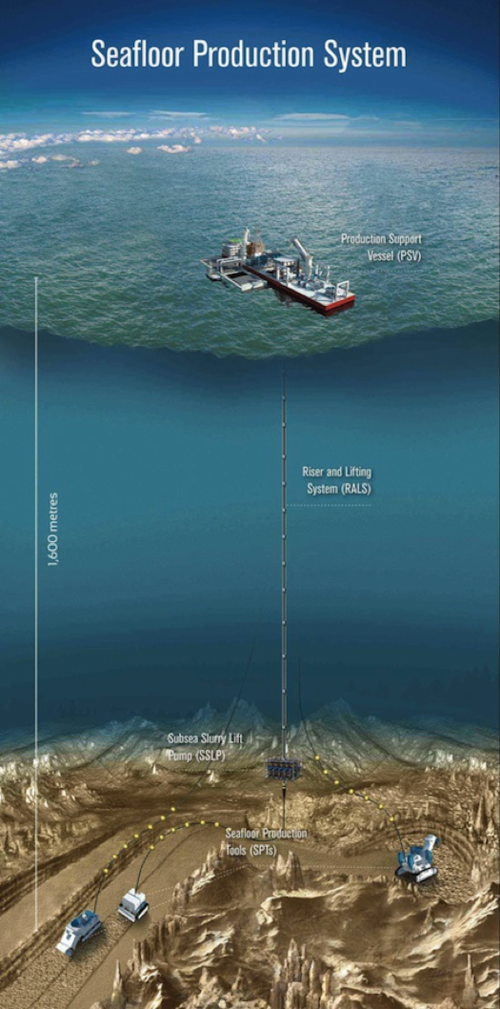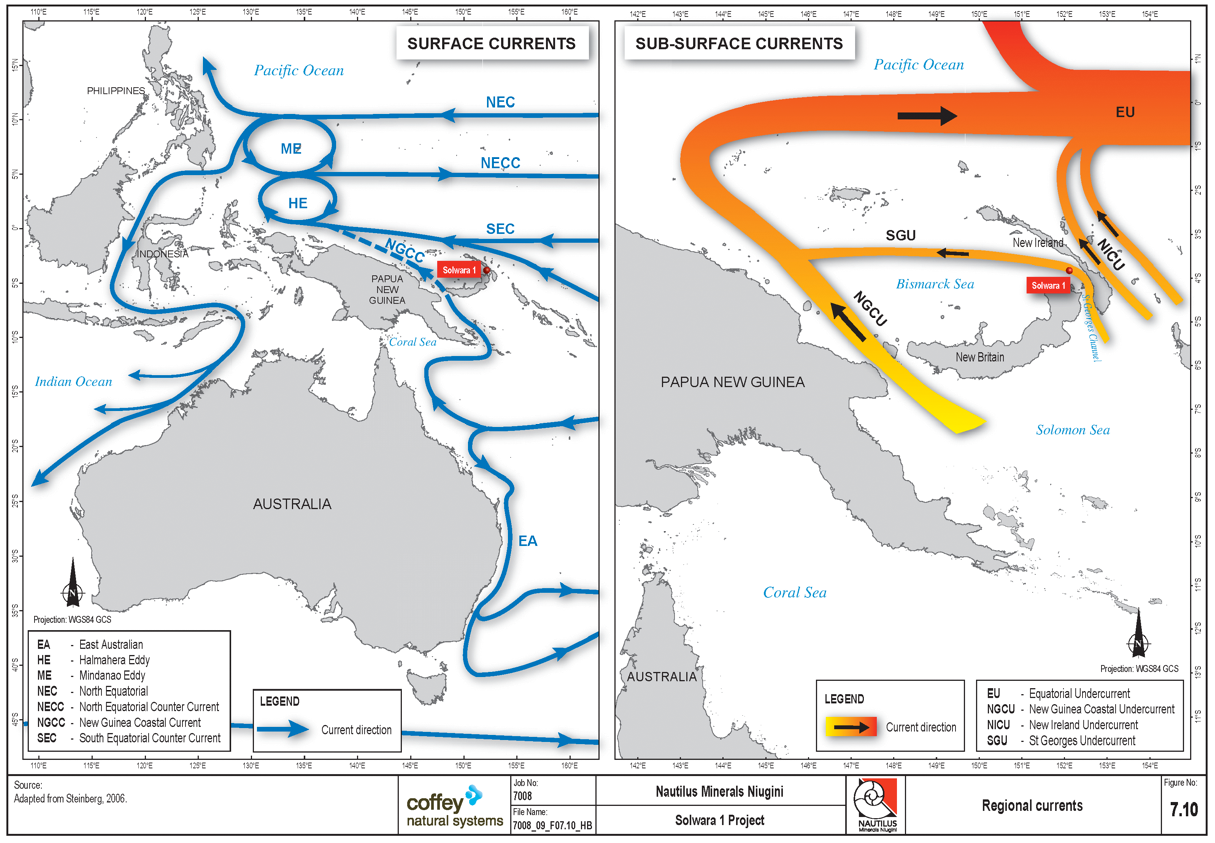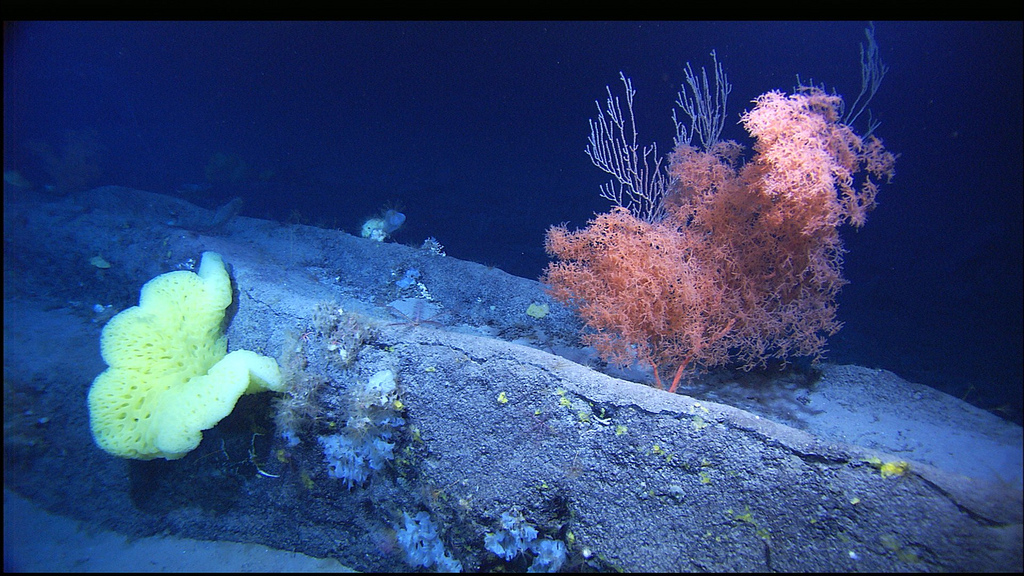1. Brief

Image: MIT Environment
Solution Initiative
Nautilus Minerals is a small cap Canadian company, registered in Brisbane Australia and majority owned by an Oman Group. Described as an *experimental* seafloor mining company, engaging in the exploration and development of Seafloor Massive Sulphide systems in the Bismarck Sea. The company has planned to use remote-controlled heavy machinery and hydraulic pump to mine the minerals, including gold and copper.
 |
| Image: MIT Environment Solution Initiative |
2. Planned Experimental Mining
The latest project update indicated that the planned mining activity will start early 2019. But no definite date was announced. In fact, the company has postponed the start of production from 2017 to 2018 and (in the latest update) to 2019.
Mike Johnston, Nautilus’ CEO was positive about the seafloor production system:
"The system remains on track for initial production during the first half of 2019, subject to further financing as indicated previously.” (project update, 10/10/2017)Nautilus Minerals concept of deep sea mining is not very popular among the people living along the coastal regions of Morobe, Madang, Sepik, Manus, New Ireland and East New Britain. There is also *strong* opposition to the project voiced by prominent locals, Church leaders and national politicians (click here for details).
 |
| IMAGE: Nautilus Minerals via Massachusetts Institute of Technology website |
3. Irreversible widespread damages
Nautilus Minerals cannot underestimate the potential damage deep-sea mining can cause to marine life along the 1600 m depth; and around the area that the natural currents flow. Disturbance to undersea life and widespread impact are going to happen - you do not need a study to tell you that. For the company to announce production in 2019 and hope that minimal destruction to marine life is anticipated is unjustifiable.
The MIT(Massachusetts Institute of Technology) experts specifically wrote of the impacts of Deep Sea Mining at the Bismarck Sea, stating that the widespread impacts were not 'quantified and studied'.
'Although the proposed operations seem sound, there is some concern, that the physical oceanographic and flow transport modeling performed to date is insufficient to rigorously assess the impacts of the project. Of particular concern is whether upwelling and currents could carry pollutants up out of the deep sea, or from spills and leakages into marine food chains where they may poison marine species and the humans that eat them. All of these impacts need to be further quantified and studied.' [Digging Deep: An Integrated Approach for Assessing the Impacts of Deep-sea Mining, Professors T. Peacock, P. Lermusiaux and G. Flierl]
In fact, there is *insufficient* evidence to quantify the impact of the project. It is plain fact the marine life, surrounding habitats and locals are in imminent danger of being adversely affected.
The Post Courier front page, reporting on Honorable Gary Juffa comments, put in this way:
4. Genuine investors confidence - lacking
The Post Courier front page, reporting on Honorable Gary Juffa comments, put in this way:
“Sensitive ecosystems and life forms that the world barely knows about are in grave danger from this profit driven endeavor [Nautilus intention to mine the seafloor for Gold and Copper]. The economic benefits to PNG [PNG government owns 15% stake] are miniscule and do not justify the dangers posed by this project.” Gary Juffa, Post Courier, 05/06/2017Furthermore, the Huffington Post in comparing mining on-land and the experiential deep-sea mining cautioned stakeholders about the danger of widespread destruction to the underwater ecosystems. The post further stated the pollutants 'will travel far and wide'.
'Due to the global rarity of deep sea hydrothermal vent ecosystems, the impact of vent mining would be disproportionately high relative to terrestrial mining. Full-scale nodule mining on the abyssal plain would affect thousands of square miles of ocean floor, kill attached invertebrate communities, and create huge subsea sediment plumes that would flow and settle over thousands of square miles of seafloor. Such sedimentation would smother seabed habitat, reduce habitat complexity and biodiversity over vast areas, and post-mining recovery would be extremely slow. Mining of cobalt crusts on seamounts would cause enormous, possibly irreversible impacts to unique, productive seamount ecosystems.'Pollution will travel far and wide. R. Stiener, Huffington Post 'Deep Sea Mining a New Ocean Threat' 20/10/2015Locals around Morobe, Madang, Sepik, Manus, East and West New Britain provinces will be possibly affected as pollutants travel through the currents channels and up the food chains. With little or no understanding of the widespread impact - post mining operation in 2019 - the proposed deep sea mining could be a major disaster waiting to happen. This warning cannot be taken lightly.
 |
| Image: Courtesy of NOAA via Huffington Post |
Presently, genuine investors' interest for Nautilus' shares can be summed as lacking. External institutional investors are shying away from options and warrants, except the company's *owned* subsidiaries. The PNG Government subsidiary (Petromin/Eda Kopa) has not fully exercised its nominated 30% interest in Nautilus Minerals, Petromin has 15%.
In order words, the financing drives, private placements and or share options/warrants are actively taken up by insiders (PDF) of the company.
 |
| Nautilus Mineral share price history ADVFN accessed 16/10/2017 |
Perhaps, it is important to take into consideration that this would be the *first* for a deep sea mining of the proposed scale to be carried out - hence experimental.
From an investment point of view, invest in this junior mineral company at your own peril.
5. Finally...
Nautilus Mineral rearranged its financial options in October 2017 to raise up to US$350 million to complete the Solwara 1 project. It implied that if they could raise this money, they would be able to start production in the first half of 2019.
Warnings have been sounded regarding the vastness of possible environmental destruction and impact along the Bismarck Sea corridors and people's livelihood. The Solwara 1 deep sea project is short-term and unsustainable experimental mining prospect. Nautilus Minerals is better of leaving the sea alone.
Note
- Digging Deep: An Integrated Approach for Assessing the Impacts of Deep-sea Mining: https://environmentalsolutions.mit.edu/digging-deep-an-integrated-approach-for-assessing-the-impacts-of-deep-sea-mining
- Deep Sea Mining a New Ocean Threat: https://www.huffingtonpost.com/richard-steiner/deep-sea-mining-new-threa_b_8334428.html
5. Finally...
Nautilus Mineral rearranged its financial options in October 2017 to raise up to US$350 million to complete the Solwara 1 project. It implied that if they could raise this money, they would be able to start production in the first half of 2019.
Warnings have been sounded regarding the vastness of possible environmental destruction and impact along the Bismarck Sea corridors and people's livelihood. The Solwara 1 deep sea project is short-term and unsustainable experimental mining prospect. Nautilus Minerals is better of leaving the sea alone.
Note
- Digging Deep: An Integrated Approach for Assessing the Impacts of Deep-sea Mining: https://environmentalsolutions.mit.edu/digging-deep-an-integrated-approach-for-assessing-the-impacts-of-deep-sea-mining
- Deep Sea Mining a New Ocean Threat: https://www.huffingtonpost.com/richard-steiner/deep-sea-mining-new-threa_b_8334428.html

No comments:
Post a Comment